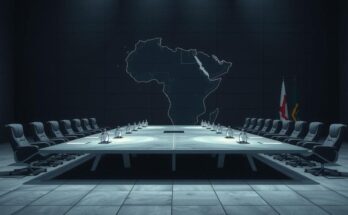Monsignor Donatien Nshole of the DRC’s Bishops’ Conference labeled the eastern DRC situation as “catastrophic” during discussions about ongoing violence from M23 rebels. With over 200,000 displaced, human rights violations have surged. Leaders agree on prayer as a path to peace amid failed diplomatic efforts.
In the Democratic Republic of Congo (DRC), a leading bishop has described the humanitarian situation in the eastern region as “catastrophic.” Monsignor Donatien Nshole, Secretary General of the Bishops’ Conference, highlighted the ongoing violence involving Rwandan-backed M23 rebels and governmental forces, which has resulted in over 200,000 people being displaced recently. During a meeting with Justice Minister Constant Mutamba, Nshole emphasized the dire state of security and humanitarian conditions that affect countless families and vulnerable individuals.
The town of Goma in North Kivu Province experienced panic after reports that M23 forces had captured the nearby city of Sake. Leopold Mwisa, a displaced resident, recounted the chaos, stating that fleeing families were lost and scattered as they attempted to escape the violence. The local community grapples with the extent of suffering, questioning the lack of effective measures to resolve the escalating conflict.
Elie Mbulegheti, Director of Communications at Caritas Butembo-Beni, described the situation as complex, pointing to widespread famine, mass displacement, and violations of human rights. Essential services such as healthcare and education have become increasingly difficult to access. The International Red Cross has reported that local hospitals are overwhelmed by casualties resulting from the ongoing fighting.
A recent report by Amnesty International has condemned the actions of both the Congolese Armed Forces and the M23 rebels for their numerous violations of international humanitarian law. The report details how explosive weapons were used indiscriminately in populated areas, resulting in civilian casualties and possible war crimes. These escalating humanitarian violations form part of a prolonged conflict that has persisted since the aftermath of the Rwandan genocide in 1994.
Attempts to resolve this conflict through diplomacy have largely failed, with the latest talks between DRC and Rwandan leaders being aborted due to unresolved issues. There is now a prevailing consensus among religious leaders and government officials that prayer may facilitate peace. Both parties have agreed to hold a day of prayer on February 9, 2025, emphasizing that their spiritual focus is on achieving peace and reconciliation, rather than merely winning the war.
The current humanitarian crisis in the eastern Democratic Republic of Congo is a result of decades of conflict that began following the Rwandan genocide in 1994. The region has seen continuous violence due to various armed groups, including the M23 rebels, exacerbated by geopolitical tensions and ongoing ethnic strife. The United Nations estimates that the conflict has led to over six million deaths and millions of displacements, complicating efforts for peace. Recent violence has intensified calls for prayer and humanitarian assistance as the local community suffers immensely.
The humanitarian situation in eastern DRC remains dire, with escalating violence resulting in mass displacement and severe human rights violations. Religious and government leaders emphasize the need for prayer and peace as diplomatic efforts historically fail. As suffering continues, the international community is urged to take more decisive actions to protect vulnerable populations and restore stability in the troubled region.
Original Source: cruxnow.com




